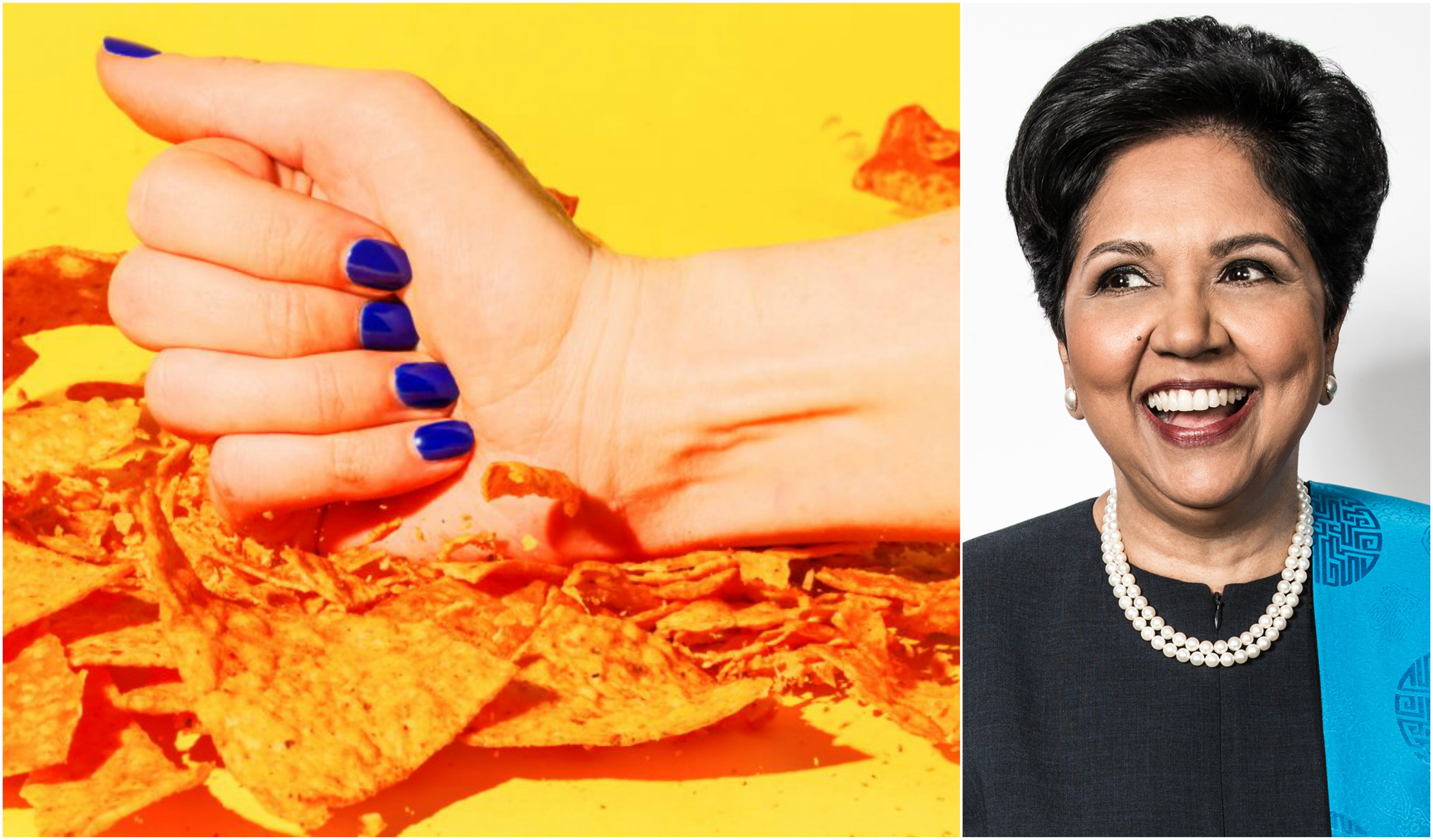PepsiCo’s CEO, Indra Nooyi, said last week that they were coming out with a line of chips exclusively for women that would suit ‘female snacking habits’ – lady chips, if you will.
Nooyi, in an interview with Freakonomics Radio, said that when young men eat chips like Doritos, in particular, they, “lick their fingers with great glee, and when they reach the bottom of the bag, they pour the little-broken pieces into their mouth”.
Which she followed with, “Women I think would love to do the same, but they don’t. They don’t like to crunch too loudly in public, and, you know, they don’t lick their fingers generously and they don’t like to pour the little-broken pieces and the flavour into their mouth”.
She went on to say that the company was soon planning to launch snacks designed and packaged differently for women. She said these specially designed feminine versions of chips would be easy to carry in a purse, would have low-crunch to accommodate the feeling of embarrassment that PepsiCo thinks women face while chewing and won’t have flavour sticking to the fingers of women who can now opt to eat this refreshingly feminine version of a snack.
The gendering of products can be seen in soaps, body washes, shampoos, perfumes and even toothpaste.
Except, there is nothing refreshing about Nooyi’s idea or the concept of gendered marketing. The tedious and often harmful concept of gendered marketing has been around for years and is liberally used by manufacturers. Marketing products as exclusively feminine or masculine is a tactic used by various companies for a very long time now.
A few popular examples of gendered marketing is masculine face washes exclusively for the ‘tough skin’ of men. There are face washes for men, with every other face wash that doesn’t particularly say it is for men being considered feminine and thus, somehow incapable of doing its job which is getting rid of dirt.
Another recurring problem is, these advertisements for masculine products say things like, “mardo ki touch skin ke liye” (the man’s touch in skin improvement) and “kyun ki mardo ko chaiye zyada” (because men want more).
Also Read: Oh No Dove, You Did Not Just Say That
The similar gendering of products can be seen in soaps, body washes, shampoos, perfumes and even toothpaste. We have been so used to this and so desensitised to this that it takes the gendering of food to see what’s wrong with the gendering of products as a marketing gimmick.
Most products marketed as male or masculine usually reinforce the negative stereotypes associated with masculinity and associate these products with manhood, toughness, macho-ness and other traits that are stereotypically considered as masculine. On the other hand, we have products marketed as feminine that are almost always associated with fragility, flowers and softness. The advertisements for these products tell us the same story.
Gendered marketing is popular only because it helps play to the tune of the ego of men that patriarchy demands they have. These ‘tough’ products marketed for ‘real men’ validate their masculinity. As for women, to preserve the perceived innate delicateness of their being – which again is demanded by patriarchy – they need to opt for these products that will preserve this intrinsic fragility. This comes from women being conditioned into believing that the delicateness and fragility of their being validates their existence as ‘good women’.
Gendered marketing always manipulates existing stereotypes and promotes harmful ideas that these big companies claim to fight on one hand. If in 2018 we think women cannot eat their chips without thinking of how people will perceive them, then we have a problem. If we gender edibles or any other product, we have a problem. Ultimately, if companies don’t stop promoting negative stereotypes associated with masculinity and femininity to sell goods we will have a problem.
These ‘tough’ products marketed for ‘real men’ validate their masculinity.
Marketing gimmicks and tactics are okay as long as they don’t create an atmosphere that harms important social causes, but gendered marketing always does. We now have billions of people believing that toiletries and everyday products have a gender of their own because a company said so and we use these gendered products to validate our masculinity or to keep intact our ‘delicacy’.
What we fail to see in the process is, men having to be masculine and women having to be delicate. These are baseless stereotypes introduced time and time again, and reinforced by patriarchy. Companies play to the tune of existing stereotypes to promote their gendered products that are only marketing gimmicks.
Though a money making tactic for companies, these ridiculous gendered marketing attempts only give into the portrayal of women as fragile, delicate and sensitive and men as tough, powerful and strong. The stereotypes that so many of us work to eradicate every single day are only reinforced by these massive companies trying to capitalize on a grim situation.
Also Read: ‘MAA’vellous Tales: Ever-Growing Obsession With Mothers In Advertisements
Featured Image Credit: Business Insider India
About the author(s)




